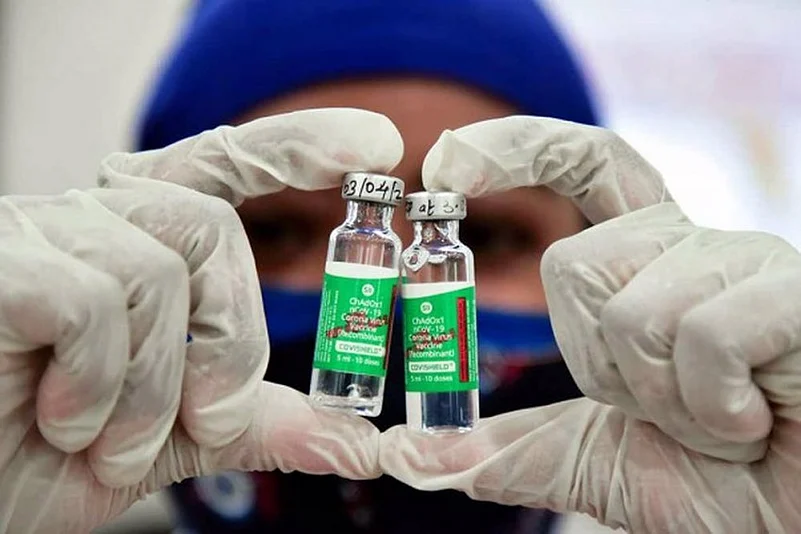According to a new UK study, the rate of coronavirus infection can be cut by around 65 per cent by a single dose of either the Oxford/AstraZeneca or Pfizer/BioNTech vaccines, currently being administered in the UK.
Single Dose Of Pfizer, Oxford Vaccine Cuts Covid-19 Infection Rate By 65%: New Study
The results of the new study will come as a boost for the UK’s vaccination programme, which has been progressing at speed with a target to cover all adults by July-end on track.

The findings indicate a promising effect on hospitalisations and deaths from? COVID-19 infections after vaccinations. But researchers caution that vaccinated people could still be re-infected and trigger an asymptomatic spread of the deadly virus, making the need for social distancing and face masks still crucial.
A combination of two studies by the University of Oxford and the Office of National Statistics (ONS), which are yet to be published, also found that a single jab of the two-dose vaccines protected older and more vulnerable people almost as well as younger and healthier individuals.
The researchers analysed? COVID-19 test results from more than 350,000 people in the UK between December 2020 and April 2021 and found that 21 days after a first jab – the time it takes the immune system to mount a decent response – new? COVID-19 infections dropped.
“Odds of new SARS-CoV-2 infection were reduced 65 per cent in those =21 days since first vaccination with no second dose versus unvaccinated individuals without evidence of prior infection,” the study noted.
“In those vaccinated, the largest reduction in odds was seen post second dose (70-77 per cent). There was no evidence that these benefits varied between Oxford/AstraZeneca and Pfizer/BioNTech vaccines,” it added.
The researchers, in the large community surveillance study, conclude that vaccination with a single dose of Oxford/AstraZeneca or Pfizer/BioNTech vaccines, or two doses of Pfizer/BioNTech, significantly reduced new SARS-CoV-2 [Covid-19] infections.
“Greater reductions in symptomatic infections and/or infections with a higher viral burden are reflected in reduced rates of hospitalisations/deaths, but highlight the potential for limited ongoing transmission from asymptomatic infections in vaccinated individuals,” read the conclusions.
The second study, in nearly 46,000 adults who had been vaccinated with one dose, found strong antibody responses – a sign that the vaccines are stimulating the body's defence system to protect against the virus – in all age groups. These antibody responses were "broadly sustained out to 10 weeks afterwards", the researchers said.
"We don't yet know exactly how much of an antibody response, and for how long, is needed to protect people against getting Covid-19 in the long term – but over the next year, information from the survey should help us to answer these questions," said Professor Sarah Walker, chief investigator on the studies, from Oxford University.
Both studies are based on data from the Covid-19 Infection Survey, a partnership between the University of Oxford, the ONS and the government’s Department for Health and Social Care (DHSC).
The results will come as a boost for the UK’s vaccination programme, which has been progressing at speed with a target to cover all adults by July-end on track. The National Health Service (NHS) said this week that its vaccination programme has now protected around 28 million people in England with at least one jab and delivered more than 9 million second doses.
"We're seeing patients coming forward in record numbers for their Oxford/AstraZeneca second doses. People are voting with their feet, showing continuing strong public support for the NHS covid vaccination campaign which has already saved over 10,000 lives," said Sir Simon Stevens, NHS chief executive.
During April, the NHS said it has been focusing on second doses, but appointments are still available for those in the initial priority groups who may still need their first doses.
“Anyone aged 45 and over can still arrange their jab, as well as people who are clinically vulnerable or a health and care worker, who should contact their general practitioner (GP) for an appointment,” the NHS said.
It is also inviting those eligible for a jab by letter and text, with some GPs also calling unvaccinated patients personally to encourage uptake.
Doctors, nurses and other healthcare professionals are delivering vaccines at more than 1,600 sites ranging from cathedrals, mosques and temples to racecourses, sports stadiums, cinemas and museums, with more than 20 offering the Moderna jab over the last week.
(With PTI inputs.)


















